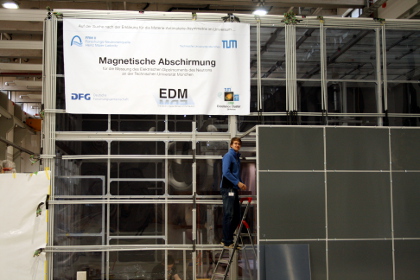Knapp 5 Millionen Euro für Hochpräzisions-Experimente mit ultrakalten Neutronen
Knapp 5 Millionen Euro für Hochpräzisions-Experimente mit ultrakalten Neutronen
Nachrichten aus dem Physik-Department - 2013-05-10

Die Deutsche Forschungsgemeinschaft (DFG) fördert erneut den Aufbau der Hochpräzisions-Experimente mit ultrakalten Neutronen an der Forschungs-Neutronenquelle Heinz Maier-Leibnitz (FRM II) in Garching. Für die Messung des elektrischen Dipolmoments des Neutrons erhalten die Forschungsgruppe von Prof. Dr. Peter Fierlinger am Physik-Department und am Exzellenzcluster Universe der TU München sowie die Physikalisch-Technische Bundesanstalt Berlin gemeinsam 3,45 Millionen Euro. Weitere 1,25 Millionen Euro stellt die DFG für die Messung der Lebensdauer des Neutrons durch die Forschungsgruppe von Prof. Dr. Stephan Paul am Physik-Department bereit, der auch Leiter des Schwerpunktprogramms „Präzisionsexperimente zur Teilchen- und Astrophysik mit kalten und ultrakalten Neutronen“ ist, in dessen Rahmen die Vorhaben finanziert werden.
Für beide Hochpräzisions-Experimente werden extrem langsame, so genannte ultrakalte Neutronen (UCN) benötigt. Die derzeit an der Forschungs-Neutronenquelle Heinz Maier-Leibnitz (FRM II) sich in der Errichtung befindliche UCN-Quelle wird eine um bis zu tausendmal höhere Dichte dieser Teilchen am Experiment ermöglichen und damit die stärkste Quelle ultrakalter Neutronen der Welt sein.
Ein kleines aber messbares elektrische Dipolmoment des Neutrons würde unter anderem eine Erklärung dafür liefern, warum nach dem Urknall so viel mehr Materie als Antimaterie hervorgegangen ist - warum also das uns bekannte Universum überhaupt entstehen konnte. Um eine hundertmal genauere Messung als bisher möglich zu realisieren, wird dazu im Rahmen einer internationalen Kollaboration aus Experten unterschiedlicher Disziplinen am FRM II ein weltweit einzigartiges Experiment aufgebaut. Hier soll, analog zum Large Hadron Collider (LHC) am CERN, die Physik jenseits des Standardmodells der Teilchenphysik getestet werden, jedoch mit komplementären Ansätzen.
Die Forschungsgruppe von Prof. Dr. Stephan Paul wird mit Hilfe ultrakalter Neutronen die Lebensdauer des Neutrons mit bisher nicht erreichter Genauigkeit neu bestimmen. Freie Neutronen zerfallen nach knapp 15 Minuten, allerdings ist dieser Wert bisher vergleichsweise ungenau bekannt. Eine präzise Kenntnis der Lebensdauer des Neutrons ist für Teilchenphysiker im Zusammenhang mit dem Standardmodell von großer Bedeutung und spielt auch beim Verständnis der Elemententstehung im frühen Universum eine große Rolle.
„Hochpräzisions-Experimente mit ultrakalten Neutronen bilden einen wichtigen Forschungszweig, der die Beschleunigerexperimente ergänzt“, sagt Prof. Dr. Stephan Paul. „Diese Unterstützung durch die DFG ist ein Zeichen der hervorragenden Forschungsförderung in Deutschland.“ Die Fördermittel werden für die Entwicklung neuartiger Messapparaturen und die Unterstützung junger Wissenschaftler verwendet.
- Redaktion
- Petra Riedel, petra.riedel@universe-cluster.de
Links
- Arbeitsgruppe Prof. Peter Fierlinger
- Arbeitsgruppe Prof. Stephan Paul
- Excellence Cluster Universe
- Forschungs-Neutronenquelle Heinz-Maier-Leibnitz (FRM II)